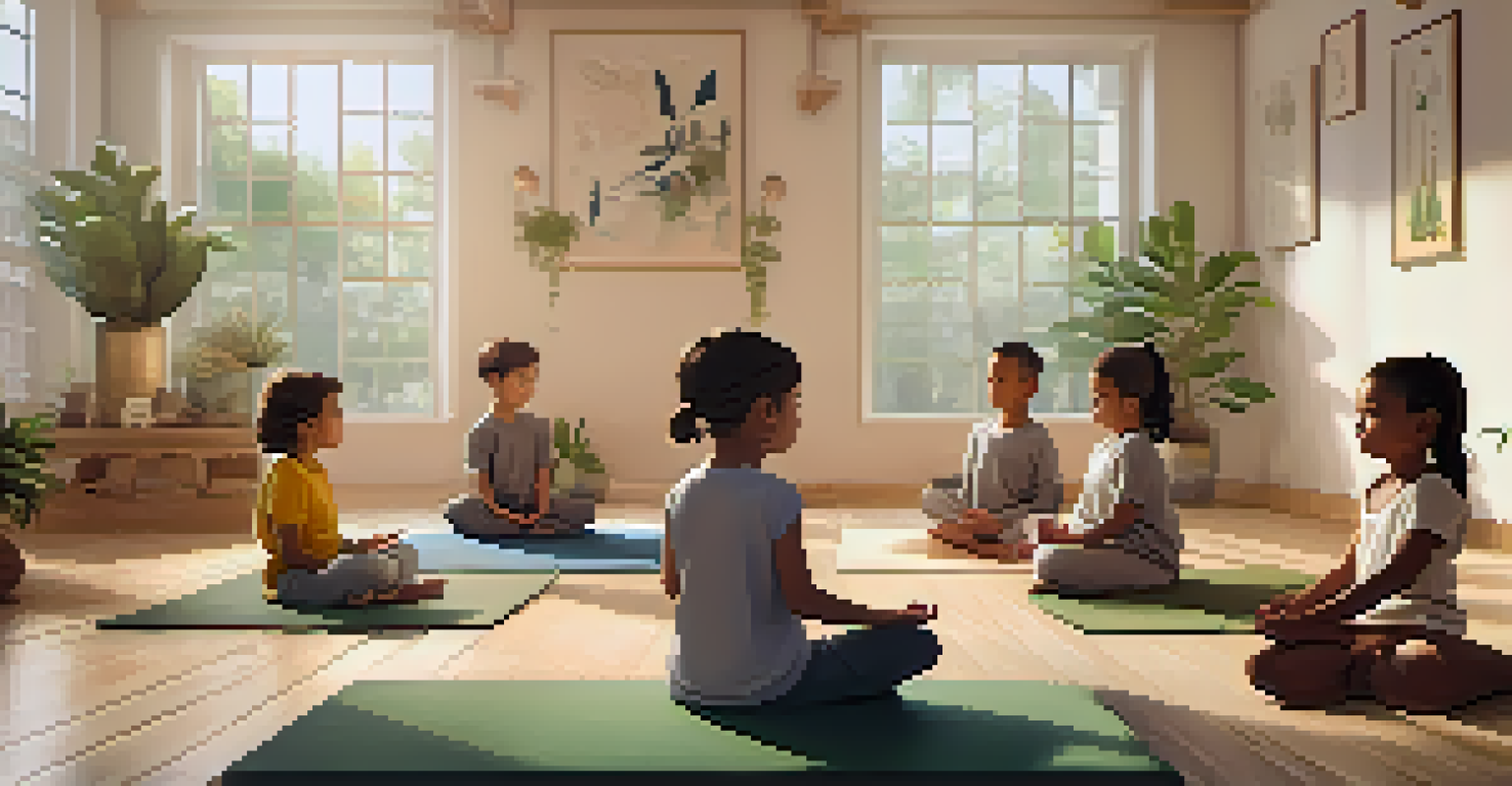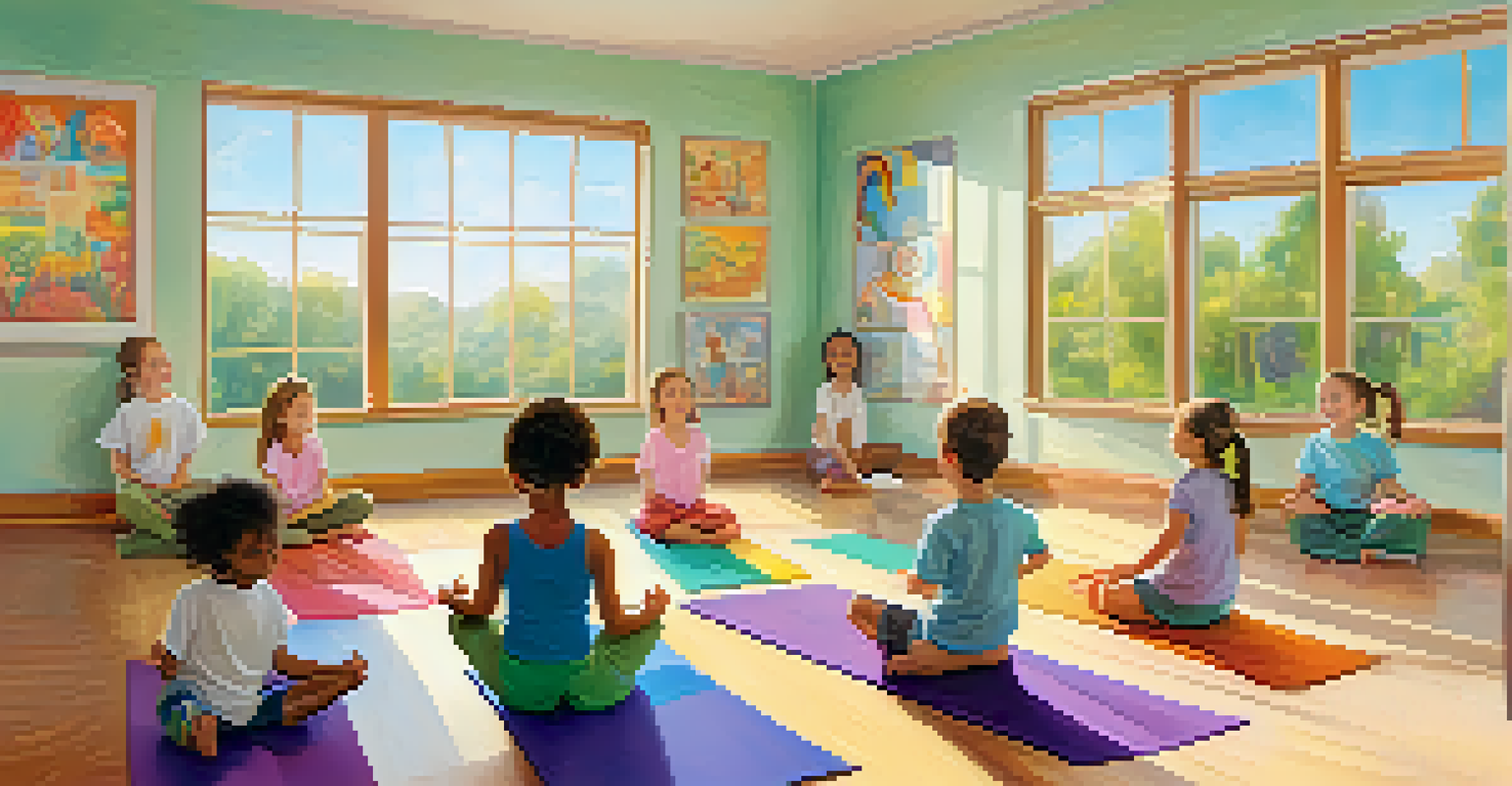The Benefits of Yoga for Kids' Physical and Mental Health

Yoga as a Fun Physical Activity for Kids
Yoga is a fantastic way for kids to engage in physical activity while having fun. Unlike traditional sports, yoga emphasizes movement and creativity, allowing children to express themselves through various poses. This playful approach helps kids develop flexibility, balance, and strength without the pressure of competition.
Yoga is the journey of the self, through the self, to the self.
Incorporating yoga into a child's routine can foster a love for movement that lasts a lifetime. It transforms exercise from a chore into an enjoyable experience. Kids can learn to appreciate their bodies and capabilities while gaining confidence in their physical skills.
Furthermore, yoga can be adapted to suit any age or skill level, making it accessible for everyone. Whether it's a gentle flow or a more dynamic session, kids can find their rhythm and enjoy the benefits of moving their bodies.
Enhancing Focus and Concentration through Yoga
One of the surprising benefits of yoga for kids is its ability to improve focus and concentration. The practice encourages mindfulness, which is the art of being present in the moment. As kids learn to concentrate on their breath and movements, they naturally enhance their ability to focus on tasks in school and everyday activities.

In a world filled with distractions, teaching children to center themselves through yoga can lead to better academic performance. They learn to approach their studies with a calm and focused mindset. This skill can also help them manage stress and anxiety related to schoolwork.
Yoga Enhances Kids' Focus
Practicing yoga helps children develop mindfulness, improving their focus and concentration in school and daily activities.
Moreover, the breathing techniques learned in yoga can be particularly helpful before tests or presentations. By practicing deep breathing, children can calm their nerves and sharpen their focus, leading to improved outcomes.
Building Emotional Resilience with Yoga
Yoga teaches kids how to navigate their emotions, creating a foundation for emotional resilience. Through poses and breathing exercises, children learn to recognize and manage feelings such as anger, sadness, or frustration. This self-awareness is crucial in helping them cope with life's challenges in a healthy way.
The body is your temple. Keep it pure and clean for the soul to reside in.
When children practice yoga, they also learn to accept their emotions without judgment. This acceptance paves the way for healthier emotional regulation and helps them develop empathy towards others. The ability to understand one's own feelings can lead to improved relationships with peers and family.
Additionally, many yoga classes incorporate discussions about emotions and mindfulness, further enriching kids' emotional intelligence. By fostering an environment of acceptance and understanding, yoga becomes a powerful tool for personal growth.
Promoting Mindfulness and Stress Relief for Kids
Mindfulness is a key component of yoga, and it plays a vital role in helping kids manage stress. In today’s fast-paced world, children often feel overwhelmed by school, social pressures, and extracurricular activities. Yoga provides them with techniques to slow down and find inner peace amidst the chaos.
Practicing mindfulness can lead to improved mental clarity and a sense of calm that helps kids handle stress better. Simple techniques, such as deep breathing and visualization, can be taught in a fun and engaging way. These practices enable children to create a mental 'safe space' they can return to whenever they need to recharge.
Builds Emotional Resilience
Yoga teaches kids to manage their emotions, fostering self-awareness and empathy that contribute to emotional resilience.
Furthermore, mindfulness cultivated through yoga can positively impact other areas of life, including sleep and overall mood. With better sleep comes improved focus and emotional stability, creating a positive feedback loop that enhances a child's overall wellbeing.
Boosting Self-Esteem and Confidence through Yoga
Yoga is a wonderful way to build self-esteem and confidence in children. As they master new poses and techniques, they gain a sense of accomplishment that translates into other areas of their lives. Each small achievement in yoga encourages them to set and reach goals, fostering a growth mindset.
Moreover, yoga promotes body positivity by encouraging kids to appreciate their bodies for what they can do rather than how they look. This shift in perspective is crucial in a society that often emphasizes appearance over ability. Children learn to celebrate their strengths and embrace their individuality.
The supportive environment of a yoga class also fosters a sense of belonging, which is vital for developing confidence. Kids can connect with peers, share experiences, and encourage one another, creating a community that uplifts and inspires.
Encouraging Social Interaction and Teamwork in Yoga
Yoga can be a fantastic avenue for social interaction among kids. Group classes create an opportunity for children to bond over shared experiences and challenges. They learn to work together, support one another, and celebrate collective achievements, fostering a sense of teamwork.
Participating in yoga with peers can also help reduce feelings of isolation or anxiety. Kids find camaraderie in shared laughter during fun poses and discover the joy of practicing together. This social aspect promotes friendships that can last beyond the yoga mat.
Promotes Social Interaction
Participating in group yoga classes encourages teamwork and social skills, helping children bond and build friendships.
Additionally, yoga classes often encourage communication and cooperation through partner poses or group activities. These fun interactions teach valuable social skills that can enhance children's relationships and improve their ability to work collaboratively.
Creating a Lifelong Love for Wellness through Yoga
Introducing children to yoga at a young age can cultivate a lifelong passion for wellness. As they explore the physical and mental benefits of yoga, they may become more inclined to pursue other healthy habits. This early exposure to mindfulness and movement sets the stage for a balanced lifestyle.
By making wellness enjoyable, kids are more likely to incorporate physical activity and mindfulness into their daily routines as they grow older. They learn that taking care of their bodies and minds is an essential part of life, leading to healthier choices in adulthood.

Moreover, yoga can serve as a foundation for other wellness practices, such as meditation or healthy eating. Children equipped with these skills and knowledge are better prepared to navigate the complexities of life, armed with tools to promote their overall wellbeing.